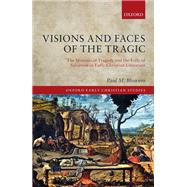Visions and Faces of the Tragic The Mimesis of Tragedy and the Folly of Salvation in Early Christian Literature
, by Blowers, Paul M.- ISBN: 9780198854104 | 0198854102
- Cover: Hardcover
- Copyright: 8/12/2020
Despite the pervasive early Christian repudiation of pagan theatrical art, especially prior to Constantine, this monograph demonstrates the increasing attention of late-ancient Christian authors to the genre of tragedy as a basis to explore the complexities of human finitude, suffering, and mortality in relation to the wisdom, justice, and providence of God. The book argues that various Christian writers, particularly in the post-Constantinian era, were keenly devoted to the mimesis, or imaginative re-presentation, of the tragic dimension of creaturely existence more than with simply mimicking the poetics of the classical Greek and Roman tragedians. It analyses a whole array of hermeneutical, literary, and rhetorical manifestations of "tragical mimesis" in early Christian writing, which, capitalizing on the elements of tragedy already perceptible in biblical revelation, aspired to deepen and edify Christian engagement with multiform evil and with the extreme vicissitudes of historical existence. Early Christian tragical mimetics included not only interpreting (and often amplifying) the Bible's own tragedies for contemporary audiences, but also developing models of the Christian self as a tragic self, revamping the Christian moral conscience as a tragical conscience, and cultivating a distinctively Christian tragical pathos. The study culminates in an extended consideration of the theological intelligence and accountability of "tragical vision" and tragical mimesis in early Christian literary culture, and the unique role of the theological virtue of hope in its repertoire of tragical emotions.







